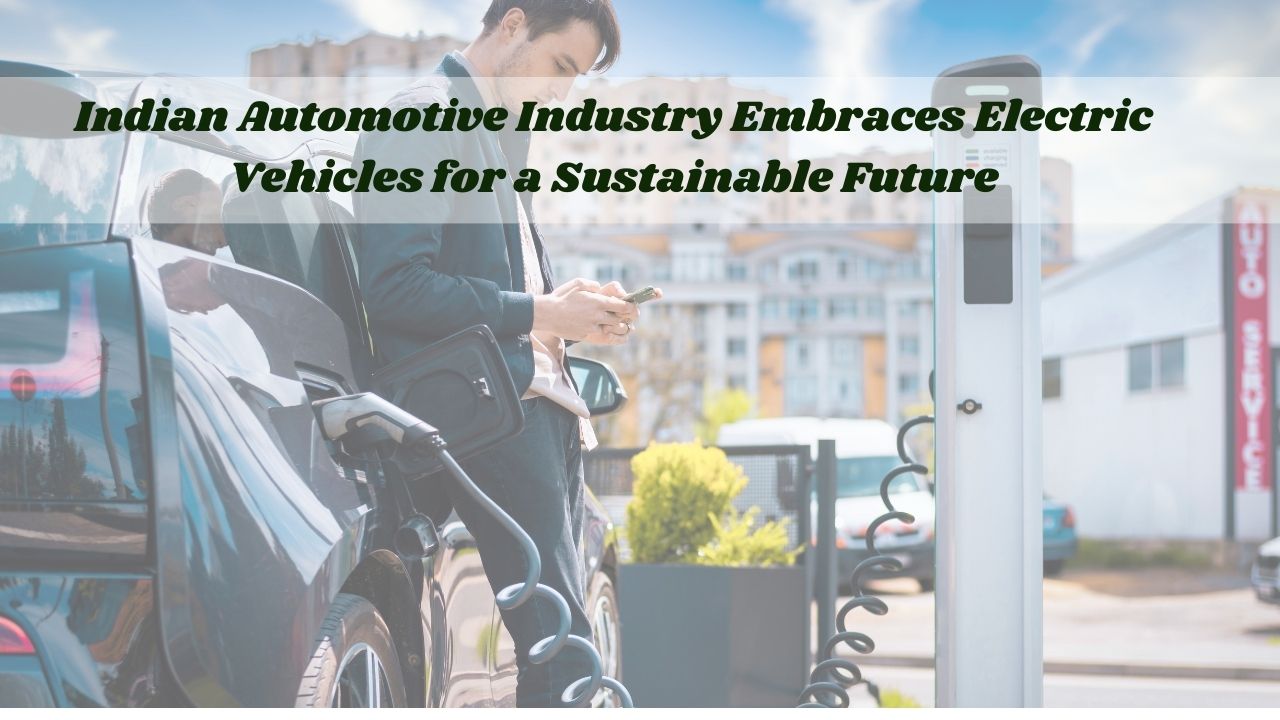Indian Automotive Industry Embraces Electric Vehicles for a Sustainable Future

India is leading the charge as an encouraging example in the global automobile industry’s transformation towards sustainable mobility, particularly in the Indian Automotive Industry. A new study titled Economics of Electric Vehicles for Passenger Transportation shows that more than half of the twenty countries evaluated could economically gain from adopting electric mobility, despite early concerns about high prices. Rising environmental awareness, a wider selection of models, and amazing technology developments are behind India’s surge in demand for electric vehicles. Sales of electric vehicles are anticipated to soar, rising from a meager 2% of the worldwide market in 2016 to a staggering 30% by 2030.
Environmental Benefits:
The considerable environmental advantages that electric vehicles provide are among the most persuasive arguments promoting their broad adoption. EVs have no exhaust emissions, in contrast to conventional internal combustion engine vehicles, which leads to cleaner air and lower pollution levels. In order to battle climate change and improve general air quality and so create a healthier and more sustainable environment, electric mobility is therefore an essential instrument.
Reduced Dependence on Fossil Fuels: Due to its large reliance on imported fossil fuels, the Indian Automotive Industry is susceptible to changes in price and supply. By fostering energy independence and lowering reliance on fossil fuels, electric vehicles offer a workable answer. Integrating EVs with clean energy generation opens the door for a sustainable and self-sufficient energy ecology as renewable energy sources become more widely available.
Technological Advancements and Infrastructure Development: The landscape of India’s automotive industry, particularly the Indian Automotive Industry. Has changed as a result of technological advancements in the electric vehicle sector. EVs are now more feasible and convenient for everyday usage because of advancements in battery technology, charging infrastructure, and electric drivetrains. A large nationwide network of charging infrastructure has been developed as a result of government and private sector cooperation, enabling long-distance travel and smooth adoption of electric vehicles.
Economic Opportunities and Job Creation:
Moving toward electric mobility has positive effects on the environment as well as considerable economic potential. The demand for qualified people in battery manufacture, electric drivetrain development, and charging infrastructure installation is growing as India establishes itself as a worldwide manufacturing powerhouse for electric vehicles. This transformation could lead to job creation, encourage technological advancement, and promote economic prosperity in the nation.
Government Initiatives and Incentives:
The Indian government has created a number of rules and incentives to hasten the adoption of electric mobility due to its importance. An enabling environment for electric vehicles. Has been greatly aided by programs like the Faster Adoption and Manufacturing of Electric Vehicles (FAME) scheme, tax incentives, subsidies for EV customers. Simple financing, and the establishment of EV-friendly regulations. These policies have motivated consumers to use environmentally friendly modes of transportation in addition to encouraging manufacturers to invest in the development of electric vehicles.
Enhancing Consumer Adoption and Awareness:
The widespread acceptance and raised consumer awareness required for the successful transition to electric mobility are crucial. Fostering this momentum requires educating consumers about. The myriad advantages of EVs, addressing issues with range anxiety and the infrastructure for charging, and highlighting. The long-term cost savings provided by EVs. We and other top manufacturers of electric vehicles are investing in research to advance battery technology, increase range, and lower costs.
Consumer education will help speed up the switch to electric mobility. Electric transportation will become more affordable and appealing to a much larger audience. As demand increases and the market drives innovation and cost reductions.
The Future Roadmap of EV Technology

The development of battery technology has long been a top priority for EVs and the Indian Automotive Industry. Battery energy density, efficiency, and lifespan are always being worked on by manufacturers. Innovative technologies, such as solid-state batteries, which provide a greater energy storage capacity and quicker charging periods, are being produced. As a result of research and development in this area. These developments are essential to making EVs more usable and feasible for daily use.
The growth of the charging infrastructure is another important factor, particularly in the context of the Indian Automotive Industry. EV charging facilities must be easily accessible in order to alleviate the issue of range anxiety. To meet a variety of needs, public charging stations, fast charging locations, and even home charging options are being developed. EV owners can rest easy knowing they can easily charge. Their vehicles when necessary thanks to the rising number of charging stations that are popping up all across the country.
peaking of worry about range, it’s a typical concern among those considering purchasing an EV. The business community is, however, aggressively seeking ways to lessen this worry. The range of EVs has significantly increased as a result of battery technological developments, as was already established. Range concern is also being reduced by AI-powered navigation and route planning systems. That can optimize travel routes and find charging stations along the way.
The advancement of autonomous driving skills is one of the most intriguing possibilities for EV technology in the future. Autonomous driving, albeit still in its infancy, has the potential to revolutionize how we travel. Self-driving electric vehicles (EVs) have the potential to be. A safer, more effective, and more practical method of transportation because to developments in AI, machine learning, and sensor technology.
Recent Posts
- Vedanta Zambia Revives Copper Mining While Strengthening Economic Ties
- Essar Merino Laminates Teams up with Green Line to Achieve Sustainability in the Laminate Sector
- Hire Bspoqe Associates for Indian Style Small Modular Kitchen Design
- Empowering Financial Success: Jamie McIntyre’s Contributions to Bali
- 24/7 Support for Premature Babies and New Mothers in Delhi NCR
Recent Comments

How You Can Bring Accuracy and Security When You Outsource Data Extraction Services

63 moons - The success story called ‘innovation in the fin-tech arena’

Indian Automotive Industry Embraces Electric Vehicles for a Sustainable Future

6 Simple & Effective Ways to Nurture Your Customer Relationships

Empowering Financial Success: Jamie McIntyre’s Contributions to Bali

How Do Google Ads Help to Grow Businesses?

Indian Automotive Industry Embraces Electric Vehicles for a Sustainable Future

